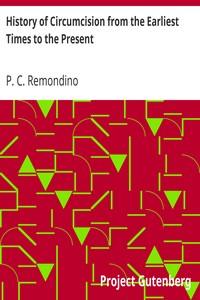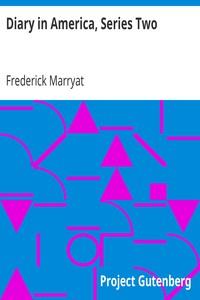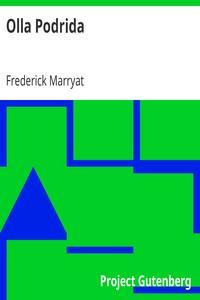Read this ebook for free! No credit card needed, absolutely nothing to pay.
Words: 118744 in 24 pages
This is an ebook sharing website. You can read the uploaded ebooks for free here. No credit cards needed, nothing to pay. If you want to own a digital copy of the ebook, or want to read offline with your favorite ebook-reader, then you can choose to buy and download the ebook.


: History of Circumcision from the Earliest Times to the Present Moral and Physical Reasons for its Performance by Remondino P C Peter Charles - Circumcision
PREFACE, iii
INTRODUCTION, 1
NOTES TO TEXT, 323
INDEX, 339
INTRODUCTION.
This book is the amplification of a paper, the subject of which was, "A Plea for Circumcision; or, the Dangers that Arise from the Prepuce," which was read at the meeting of the Southern California Medical Society, at Pasadena, in December, 1889. The material gathered for that paper was more than could be used in the ordinary limits of a society paper; it was gathered and ready for use, and this suggested its arrangement into book form. The subject of the paper was itself suggested by a long and personal observation of the changes made in man by circumcision. From the individual observation of cases, it was but natural to wish to enlarge the scope of our observation and comparison; this naturally led to a study of the physical characteristics of the only race that could practically be used for the purpose. This race is the Jewish race. On carefully studying into the subject, I plainly saw that much of their longevity could consistently be ascribed to their more practical humanitarianism, in caring for their poor, their sick, as well as in their generous provision for their unfortunate aged people. The social fabric of the Jewish family is also more calculated to promote long life, as, strangely as it may seem, family veneration and family love and attachment are far more strong and practical among this people than among Christians, this sentiment not being even as strong in the Christian races as it is in the Chinese or Japanese. It certainly forms as much of a part of the teachings of Christianity as it does of Judaism, Buddhism, or Confucianism, only Christians, as a mass, have practically forgotten it. The occupation followed by the Jews also in a certain degree favors longevity, and the influence on heredity induced by all these combined conditions goes for something. But it is not alone in the matter of simple longevity--although that implies considerable--that the Jewish race is found to be better situated. Actual observations show them to be exempt from many diseases which affect other races; so that it is not only that they recover more promptly, but that they are not, as a class, subjected to the loss of time by illness, or to the consequent sufferings due to illness or disease, in anything like or like ratio with other people.
For my part, I think that people who can go to the theatre and enjoy "As in a Looking-Glass," and witness some of the satyrical or billy-goat traits of humanity so graphically exhibited in "La Tosca," with evident satisfaction; or attend the more robust plays of "Virginius" or of "Galba, the Gladiator," with all its suggestions of the Caesarian section, and the lust and the fornications of an intensely animal Roman empress, without the destruction of their moral equilibrium or tending to induce in them a disposition to commit a rape on the first met,--I think such people can be safely intrusted to read this book.
There is a weird and ghostly but interesting tale connected with the Moslem conquest of Spain, of how Roderick, the last of the Gothic kings, when in trouble and worry, repaired to an old castle, in the secret recesses of which was a magic table whereon would pass in grim procession the different events of the future of Spain; as he gazed on the enchanted table he there saw his own ruin and his country's and nation's subjugation. Anatomy is generally called a dry study, but, like the enchanted brazen table in the ancient Gothic castle, it tells a no less weird or interesting tale of the past. Its revelations lighten up a long vista, through the thousands of years through which the human species has evolved from its earliest appearance on earth, gradually working up through the different evolutionary processes to what is to-day supposed to be the acme of perfection as seen in the Indo-European and Semitic races of man. Anatomy points to the rudiment--still lingering, now and then still appearing in some one man and without a trace in the next--of that climbing muscle which shows man in the past either nervously escaping up the trunk of a tree in his flight from many of the carnivorous animals with whom he was contemporary, or, as the shades of night were beginning to gather around him, we again see him by the aid of these muscles leisurely climbing up to some hospitable fork in the tree, where the robust habits of the age allowed him to find a comfortable resting-place; protected from the dew of the night by the overhanging branches and from the prowling hyena by the height of the tree, he passed the night in security. The now useless ear-muscles, as well as the equally useless series of muscles about the nose, also tell us of a movable, flapping ear capable of being turned in any direction to catch the sound of approaching danger, as well as of a movable and dilated nostril that scented danger from afar,--the olfactory sense at one time having a different function and more essential to life than that of merely noting the differential aroma emitted by segars or cups of Mocha or Java, and the ear being then used for some more useful purpose than having its tympanum tortured by Wagnerian discordant sounds. Our ancestors might not have been a very handsome set, nor, judging from the Neanderthal skull, could they have had a very winning physiognomy, but they were a very hardy and self-reliant set of men. Nature--always careful that nothing should interfere with the procreative functions--had provided him with a sheath or prepuce, wherein he carried his procreative organ safely out of harm's way, in wild steeple-chases through thorny briars and bramble-brakes, or, when hardly pushed, and not able to climb quickly a tree of his own choice, he was by circumstances forced up the sides of some rough-barked or thorny tree. This leathery pouch also protected him from the many leeches, small aquatic lizards, or other animals that infested the marshes or rivers through which he had at times to wade or swim; or served as a protection from the bites of ants or other vermin when, tired, he rested on his haunches on some mossy bank or sand-hill.
Man has now no use for any of these necessaries of a long-past age,--an age so remote that the speculations of Ernest Renan regarding the differences between the Semitic race of Shem and the idolatrous descendants of Ham, away off in the far mountains and valleys of Asia lying between the Mediterranean Sea and the Euphrates, seem more as if he were discussing an event of yesterday than something which is considered contemporary with our earlier history,--and we find them disappearing, disuse gradually producing an obliteration of this tissue in some cases, and the modifying influence of evolution producing it in others; the climbing muscle, probably the oldest remnant and legacy that has descended from our long-haired and muscular ancestry, is the best example of disappearance caused by disuse, while the effectual disappearance of the prepuce in many cases shows that in that regard there exists a marked difference in the evolutionary march among different individuals.
There is a strange and unaccountable condition of things, however, connected with the prepuce that does not exist with the other vestiges of our arboreal or sylvan existence. Firstly, the other conditions have nothing that interferes with their disappearance; whereas the prepuce, by its mechanical construction and the expanding portions which it incloses, tends at times rather to its exaggerated development than to its disappearance. Again, whereas the other vestiges have no injury that they inflict by their presence, or danger that they cause their possessors to run, the prepuce is from time of birth a source of annoyance, danger, suffering, and death. Then, again, the other conditions are not more developed at birth; whereas the prepuce seems, in our pre-natal life, to have an unusual and unseen-for-use existence, being in bulk out of all proportion to the organ it is intended to cover. Speculation as to its existence is as unprolific of results as any we may indulge in regarding the nature, object, or uses of that other evolutionary appendage, the appendix vermiformis, the recollection of whose existence always adds an extra flavor to tomatoes, figs, or any other small-seeded fruits.
We may well exclaim, as we behold this appendage to man,--now of no use in health and of the most doubtful assistance to the very organ it was intended to protect, when that organ, through its iniquitous tastes, has got itself into trouble, and, Job-like, is lying repentant and sick in its many wrappings of lint, with perhaps its companions in crime imprisoned in a suspensory bandage,--what is this prepuce? Whence, why, where, and whither? At times, Nature, as if impatient of the slow march of gradual evolution, and exasperated at this persistent and useless as well as dangerous relic of a far-distant prehistoric age, takes things in her own hands and induces a sloughing to take place, which rids it of its annoyance. In the far-off land of Ur, among the mountainous regions of Kurdistan, something over six thousand years ago, the fathers of the Hebrew race, inspired by a wisdom that could be nothing less than of divine origin, forestalled the process of evolution by establishing the rite of circumcision. Whether this has been beneficial or injurious to the race will be, in a measure, the object of the discussion in this book.
One object of this book is to furnish my professional brothers with some embodied facts that they may use in convincing the laity in many cases where they themselves are convinced that circumcision is absolutely necessary; but, having nothing in their text-books to back up their opinion with, their explanations are too apt to pass for their mere unfounded personal view of the matter. If the patient, or the parents of the patient, ask the physician for his authority, he is at a loss, as there is nothing that deals with the subject in any extended manner; so that this book has been written in as plain English as the subject-matter could possibly allow, so that non-professionals could easily read and understand it. I have often felt the need of such a work; people can understand emergency or accident surgery, military surgery, or reparative surgery, but such a thing as surgery to remedy a seemingly medical disease, or what might be called the preventive practice of surgery, is something they cannot understand. First, and not the least, among the incentives to skepticism on this subject is the unwelcome fact of a surgical operation, which, no matter how trivial it may seem to the surgeon, is a matter of considerable magnitude to the patient, his parents, or friends; there are risks, pain, worry, annoyances, and expenses to be undergone,--considerations which, either singly or unitedly, often lead one to reason against the operation, even when otherwise convinced of its need or utility.
Free books android app tbrJar TBR JAR Read Free books online gutenberg
More posts by @FreeBooks








